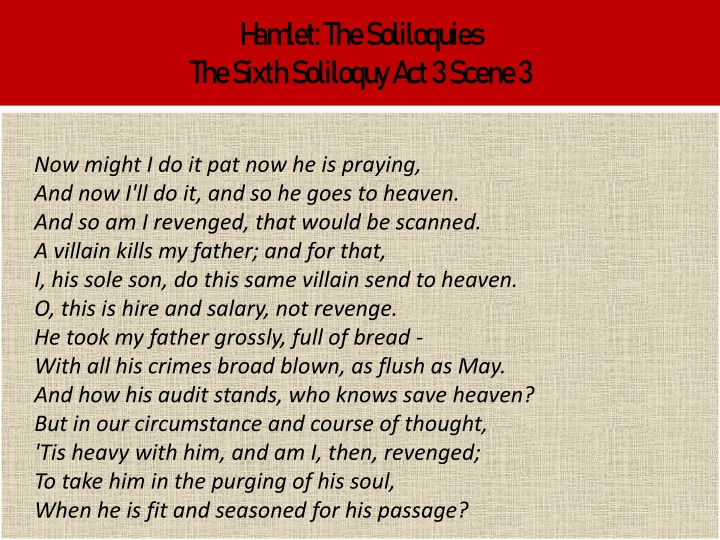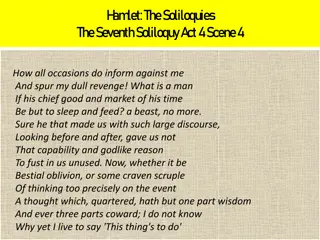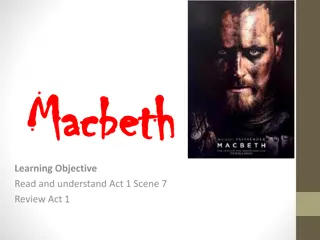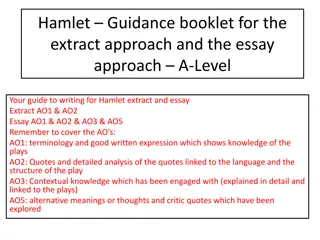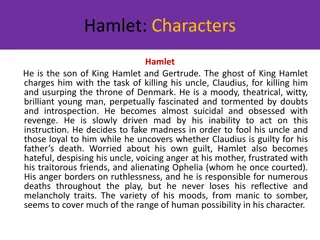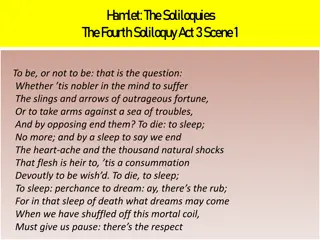Analysis of Hamlet's Sixth Soliloquy in Act 3, Scene 3
Hamlet's Sixth Soliloquy in Act 3, Scene 3 delves into his inner turmoil as he contemplates seeking revenge on Claudius for his father's murder. Despite having the perfect opportunity to kill Claudius while he prays, Hamlet hesitates, questioning whether sending him to heaven would truly be an act of revenge. The soliloquy highlights Hamlet's moral dilemma and his complex feelings towards fulfilling his duty. Ultimately, he decides to wait for a more opportune moment to exact his revenge.
Download Presentation

Please find below an Image/Link to download the presentation.
The content on the website is provided AS IS for your information and personal use only. It may not be sold, licensed, or shared on other websites without obtaining consent from the author.If you encounter any issues during the download, it is possible that the publisher has removed the file from their server.
You are allowed to download the files provided on this website for personal or commercial use, subject to the condition that they are used lawfully. All files are the property of their respective owners.
The content on the website is provided AS IS for your information and personal use only. It may not be sold, licensed, or shared on other websites without obtaining consent from the author.
E N D
Presentation Transcript
H am let: The Soliloquies The Sixth Soliloquy A ct 3 Scene 3 Now might I do it pat now he is praying, And now I'll do it, and so he goes to heaven. And so am I revenged, that would be scanned. A villain kills my father; and for that, I, his sole son, do this same villain send to heaven. O, this is hire and salary, not revenge. He took my father grossly, full of bread - With all his crimes broad blown, as flush as May. And how his audit stands, who knows save heaven? But in our circumstance and course of thought, 'Tis heavy with him, and am I, then, revenged; To take him in the purging of his soul, When he is fit and seasoned for his passage?
H am let: The Soliloquies The Sixth Soliloquy A ct 3 Scene 3 No. Up, sword, and know thou a more horrid hent: When he is drunk asleep or in his rage; Or in the incestuous pleasure of his bed; At gaming, swearing or about some act That has no relish of salvation in it. Then trip him, that his heels may kick at heaven, And that his soul may be as damned and black As hell, whereto it goes. My mother stays, This physic but prolongs thy sickly days.
H am let: The Soliloquies The Sixth Soliloquy A ct 3 Scene 3 Hamlet's Sixth Soliloquy falls in Act 3, Scene 3. The basis of this scene is formed when the play within the play has been abandoned and skipped by the guilty Claudius. Hamlet planned the play deliberately, so as to catch the conscious of the King and to find if he indeed killed his father and the dead soul was right in his blame. Now, Hamlet has found the truth and intends to kill the villain who killed his father.
H am let: The Soliloquies The Sixth Soliloquy A ct 3 Scene 3 This soliloquy arrives soon after, when he sees Claudius and draws a naked sword to kill him. He comes with such intentions but restrains himself when the thought arises in his mind that by killing the murderer King, while he is in the act of praying and seeking forgiveness for his sins, will send him directly to Heaven and this, according to Hamlet, will not be revenge. Hamlet s thinks that as he is the sole son of his dead father, and his aim is to seek revenge and fulfill the promise of his father s murder. He says that it will be unfair if he himself sends the murderer of his father straight to heaven and that will be no revenge at all.
H am let: The Soliloquies The Sixth Soliloquy A ct 3 Scene 3 Hamlet thinks that Claudius killed his father in a state, when there was no reason for God to wave his sins and misdeeds, and Hamlet s father must have paid or paying the divine penalty of his crimes and sins. Now to kill Claudius in a position, where his sins will be ignored and he will be sent straight to heaven is no revenge at all. Hence, Hamlet decides not to fulfill his task this time. He tells himself to wait for an opportunity and kill the King when he is drunk, asleep, or in his rage, or in the incestuous pleasure of his bed, at gaming, swearing or about some act that has no relish of salvation in it.
H am let: The Soliloquies The Sixth Soliloquy A ct 3 Scene 3 In this way, when Claudius will be killed, he will have to pay for his sins and misdeeds, and will be totally accountable for his crimes and that will justify the act of revenge and the promise Hamlet made to his beloved, dead father.
TH E E N D See you next time!
